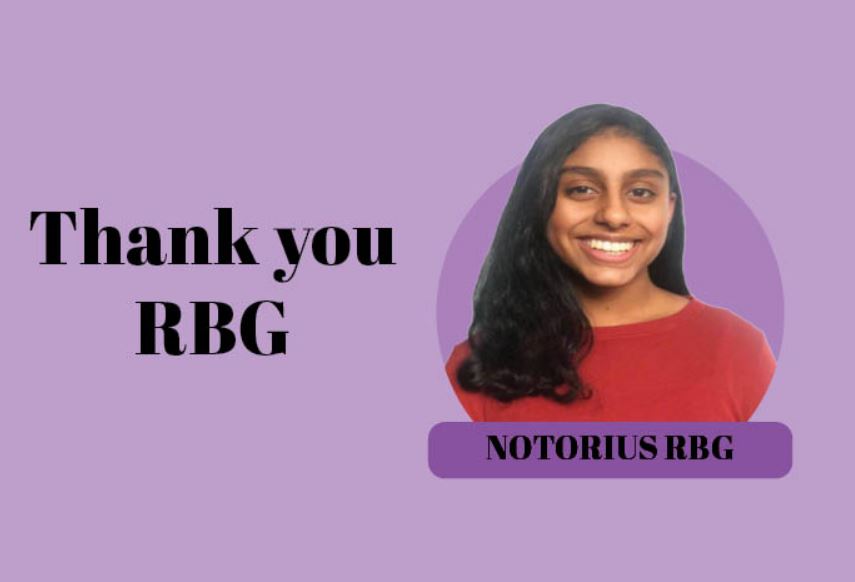When Justice Ruth Bader Ginsburg had passed, I can remember social media being flooded with endless “Thank You RBG” appreciation posts by celebrities and other influential figures. They called her a “trailblazer for women’s rights” and a “hero”. To be frank, at the time I felt extremely out of the loop. While virtually everyone seemed to be incredibly mournful over this tragic loss, I did not quite know how to feel when I heard the news of Ruth Bader Ginsburg’s (or RBG’s) passing. I knew that she was an influential figure, but she seemingly didn’t hold much importance in my life. She was never a role model figure for me; I didn’t aspire to be like her, because I honestly did not have much knowledge on her career and what she accomplished as a lawyer and a U.S Supreme Court justice. So I decided to read upon RBG, with the hopes of gaining a new respect for her and being inspired in the process. At the end that is what I ended up accomplishing.
As most people know, RBG is a patron of women’s rights and is also a proud feminist. In an interview at Columbia University, she explained that there is often a negative connotation around the word feminist. It seemed to project an impression of preferential treatment toward women because of its similarity with the word “feminine”. Based on the word, many people believe that feminists are implying that they are superior to men and should “take over” the world. However, that notion is completely false and the aim of the feminist movement is not to attain more power than men. Instead, women just want to be equal, given the same opportunities, and treated with the same dignity and respect as men.
The idea of gender-based discrimination may seem like an obvious problem today, but during RBG’s time as a lawyer in the 1960s and 1970s, this was not the case. During the same interview at Columbia University, she discussed that half the battle was convincing male judges and lawyers that gender-based discrimination is an issue embedded within our society and needs to be addressed and combated. In their minds, they believed that women are to be sheltered and protected. These men genuinely believed that they were being good husbands, fathers, and brothers to the women in their lives by prohibiting them from becoming firefighters, police officers, or even working overtime. In actuality, these laws stripped women of the ability to pursue whatever it is they desired. “Women are often put on a pedestal” RBG explained,“That pedestal is confining and puts [women] in a cage.” RBG insisted that these issues needed to be addressed. She never held back on speaking out of fear for being one of the first lawyers to present this issue; even in the face of adversary, she was fearless.
Due to RBG’s tireless and persistent efforts, new policies were put forth that gave women more liberty to make their own decisions and actually have control over their lives. One such policy was the Equal Credit Opportunity Act of 1974, which gives women the right to apply for bank accounts, credit cards, and mortgages without a male co-signer, which are privileges women enjoy and take for granted in current times.
Needless to say, the Notorious RBG was an absolute powerhouse of change, and I have an endless list of rights and liberties to thank her for. Learning about RBG’s legacy sparked a valuable introspection for me. Not only did RBG fight for women’s rights and rose to the power of a Supreme Court Justice from a mere court clerk position, but she also did it at a time where women were not taken seriously or seen as capable as a man. Although gender-based discrimination still exists today, it does not compare to the degree that it was in the 1900s, thanks to women like RBG who paved the way to a more just world. Although a lot more needs to get done towards achieving equality, the road currently provides a much smoother ride for young girls like me.































![What happened to theater etiquette? [opinion]](https://hilite.org/wp-content/uploads/2025/04/Entertainment-Perspective-Cover-1200x471.jpg)













































![Review: “The Immortal Soul Salvage Yard:” A criminally underrated poetry collection [MUSE]](https://hilite.org/wp-content/uploads/2025/03/71cju6TvqmL._AC_UF10001000_QL80_.jpg)
![Review: "Dog Man" is Unapologetically Chaotic [MUSE]](https://hilite.org/wp-content/uploads/2025/03/dogman-1200x700.jpg)
![Review: "Ne Zha 2": The WeChat family reunion I didn’t know I needed [MUSE]](https://hilite.org/wp-content/uploads/2025/03/unnamed-4.png)
![Review in Print: Maripaz Villar brings a delightfully unique style to the world of WEBTOON [MUSE]](https://hilite.org/wp-content/uploads/2023/12/maripazcover-1200x960.jpg)
![Review: “The Sword of Kaigen” is a masterpiece [MUSE]](https://hilite.org/wp-content/uploads/2023/11/Screenshot-2023-11-26-201051.png)
![Review: Gateron Oil Kings, great linear switches, okay price [MUSE]](https://hilite.org/wp-content/uploads/2023/11/Screenshot-2023-11-26-200553.png)
![Review: “A Haunting in Venice” is a significant improvement from other Agatha Christie adaptations [MUSE]](https://hilite.org/wp-content/uploads/2023/11/e7ee2938a6d422669771bce6d8088521.jpg)
![Review: A Thanksgiving story from elementary school, still just as interesting [MUSE]](https://hilite.org/wp-content/uploads/2023/11/Screenshot-2023-11-26-195514-987x1200.png)
![Review: "When I Fly Towards You", cute, uplifting youth drama [MUSE]](https://hilite.org/wp-content/uploads/2023/09/When-I-Fly-Towards-You-Chinese-drama.png)
![Postcards from Muse: Hawaii Travel Diary [MUSE]](https://hilite.org/wp-content/uploads/2023/09/My-project-1-1200x1200.jpg)
![Review: "Ladybug & Cat Noir: The Movie," departure from original show [MUSE]](https://hilite.org/wp-content/uploads/2023/09/Ladybug__Cat_Noir_-_The_Movie_poster.jpg)
![Review in Print: "Hidden Love" is the cute, uplifting drama everyone needs [MUSE]](https://hilite.org/wp-content/uploads/2023/09/hiddenlovecover-e1693597208225-1030x1200.png)
![Review in Print: "Heartstopper" is the heartwarming queer romance we all need [MUSE]](https://hilite.org/wp-content/uploads/2023/08/museheartstoppercover-1200x654.png)



